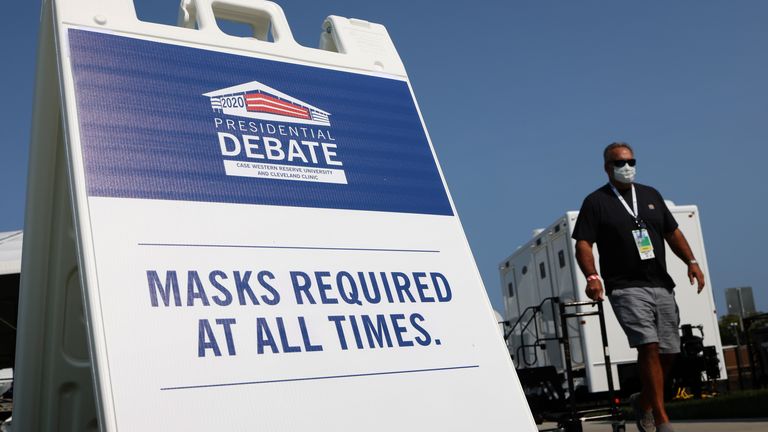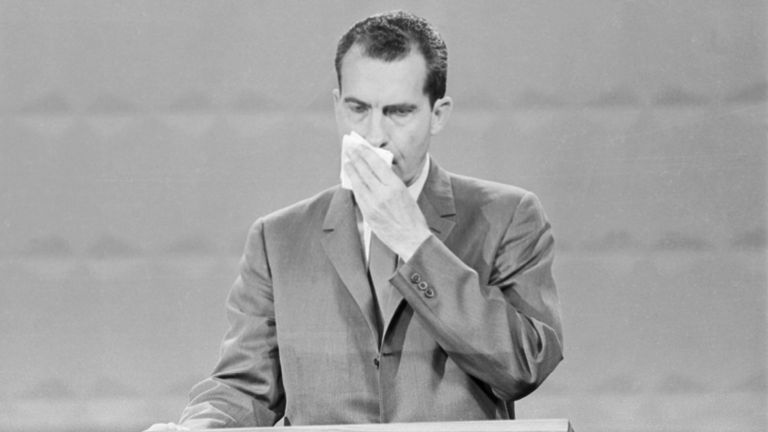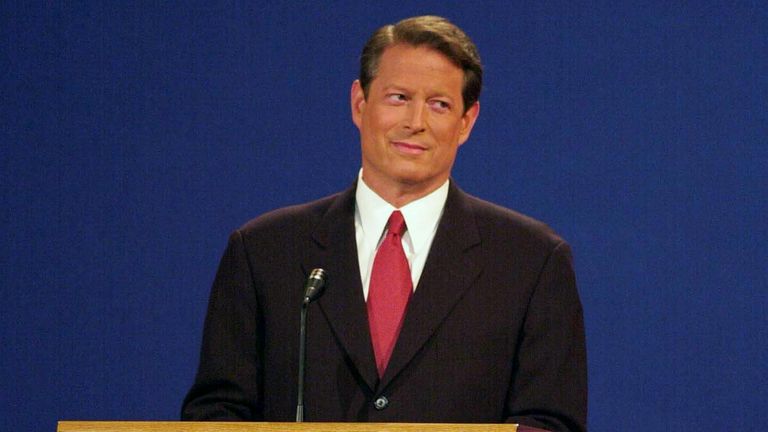US Election 2020: When are the presidential debates and how do they work?
The US presidential election steps up a gear this week, as Donald Trump and Joe Biden square off in their first televised presidential debate on Tuesday night.
While many may see the contests as entertainment as both candidates try to expose their rivals’ record and fluster their opponent, with the coronavirus lockdown having kept Mr Biden out of the limelight it is a chance for both men to make some inroads in key battleground states.
Here’s what to expect in the 2020 presidential and vice presidential debates:
When and where are they?
There will be three live TV debates pitting incumbent Mr Trump against Democratic nominee Mr Biden.
The first takes place on Tuesday night (early Wednesday morning GMT) at Case Western Reserve University and Cleveland Clinic in Cleveland, Ohio. Ohio is traditionally a key battleground state in the race for the White House.
The second debate will be held at the Adrienne Arsht Center for the Performing Arts in Miami, Florida, on 15 October and the final debate takes place on 22 October at the Curb Event Center, Belmont University, in Nashville, Tennessee.
There will also be one vice presidential debate between Democratic nominee Kamala Harris and incumbent Mike Pence. That takes place on 7 October at the University of Utah in Salt Lake City.
What’s the format?
The first debate will have Fox News Sunday anchor Chris Wallace as moderator. Moderators for the debates are chosen by the non-partisan Commission on Presidential Debate.
In this one, Mr Wallace has chosen six topics to be covered and each has 15 minutes allocated to it for discussion. Both candidates get two minutes to initially respond to the question, before they can turn it on each other.
However, the commission has said topics are subject to change because of recent events – such as the decision not to charge police officers directly over the killing of Breonna Taylor and the subsequent protests in the US, or the death of Supreme Court Justice Ruth Bader Ginsburg and plans to fill her seat, could also come up.
The second debate is in a town hall format.
This means half the questions posed to both men will come from uncommitted voters in the hall itself (COVID-19 restrictions permitting), while the other half is influenced by voter concerns on social media. It allows for a more unpredictable line of questioning and could see both candidates put on the spot.
This second debate is being moderated by Steve Scully, political editor of the C-SPAN TV network and host of its morning call-in show Washington Journal.
This election’s final debate will be moderated by NBC White House correspondent Kristen Welker and will be similar to the first debate. We don’t know what topics the candidates will face yet, they’re usually announced a week before the event.
2020’s vice presidential debate will be moderated by Susan Page, Washington bureau chief for USA Today. Again, we don’t yet know the topics that will be raised.
What’s going to come up?
We know the six topics chosen by Chris Wallace in Tuesday night’s first debate. They are: the Trump and Biden records; the Supreme Court; COVID-19; the economy; race and violence in our cities, and the integrity of the election.
Those are subject to change as previously mentioned, but expect the candidates to steer their answers to try to reflect badly on their opponent.
In some sense, it’s for Joe Biden to make the case that he belongs in the Oval Office as Donald Trump is a known commodity in the spotlight.
Mr Biden will need to dispel any doubts that he is too old to be president – he would be 78 by the time he entered the White House – and will have to shrug off concerns about his mental abilities and avoid any of the verbal slip ups that dogged him during the Democratic nomination contest.
:: Subscribe to Divided States on Apple podcasts, Google Podcasts, Spotify, and Spreaker
Mr Trump, on the other hand, will be trying to trip his opponent up by rattling Mr Biden on stage and belittling his rival at any opportunity, including highlighting concerns about his mental acuity.
For that reason, we can expect revelations about Mr Trump’s tax returns to come up, and no doubt Mr Biden’s son Hunter will get a mention.
Do they make a difference?
Viewing figures for presidential debates have been on the decline for some time, but they still attract audiences of millions.
In Ohio, Mr Biden is currently ahead by 3.3 points – with 49% compared with 45.7% – according to a polling average by RealClear Politics. Nationally, it has Mr Biden ahead by 7% on 49.8%.
Debates often shift polls by a few percentage points either way, and the 2020 debates could therefore help those crucial floating voters make their minds up.
A good performance by either candidate could make a difference in some of the battleground states, and even a slight edge in polls can build to a majority in the race to the White House, so in close races they have more of an impact.
It’s worth remembering, though, that there are strong partisan loyalties in US politics and for the vast majority of viewers, they may already have made up their minds.
The reaction to Mr Trump and Mr Biden’s performance in the debate could play more of a role in shaping the election outcome, so keep your eyes on the media and social media in particular.
Has a presidential race been decided by the debates?
The short answer is no, there are too many factors in an election to say that it’s just one that decides the outcome.
However, a poor performance can certainly start the ball rolling in favour of one candidate.
The first ever televised debate in 1960, between then-Democratic Senator John F Kennedy and sitting vice president Richard Nixon is one such example.
Mr Kennedy ensured he looked fresh for the camera close-ups, while Mr Nixon – who had been unwell and was still recovering from illness – had on an ill-fitting suit and could be seen regularly wiping sweat from his brow.
As a result, Mr Kennedy saw a jump in the polls after he was widely perceived by the 70 millions viewers to have “won” the debate. He went on to win a close election with 49.72% of the vote.
In 2000, Democratic candidate Al Gore’s performance against George Bush – in which he sighed and rolled his eyes at the Republican’s responses – did not win him any favours with voters who viewed his performance as condescending.
That saw him lose ground in the polls and although he won the popular vote, it was George Bush who took the keys to the White House.
Source: Read Full Article





